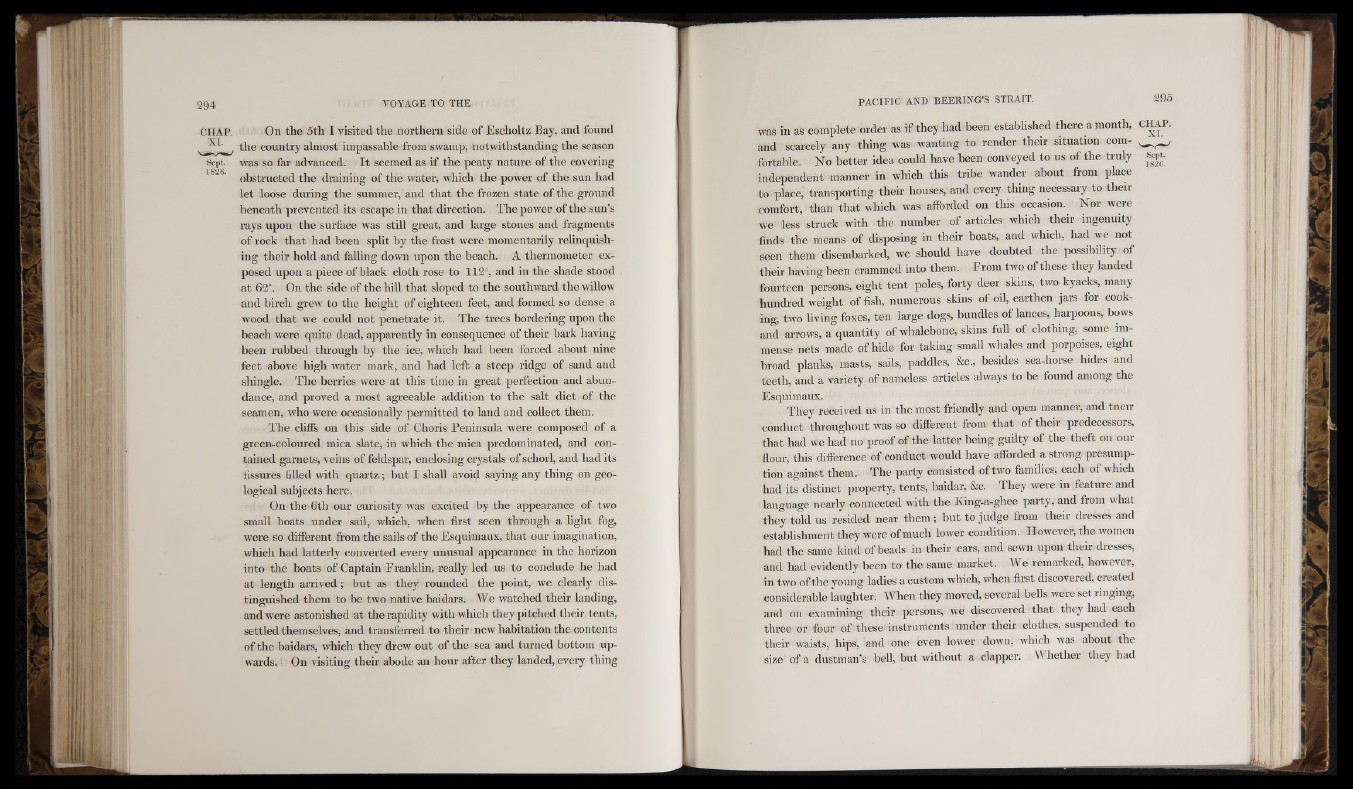
On the Sth I visited the northern side of Escholtz Bay, and found
the country almost impassable from swamp, notwithstanding the season
was so far advanced. It seemed as if the peaty nature of the covering
obstructed the draining of the water, which the power of the sun had
let loose during the summer, and that the frozen state of the ground
beneath prevented its escape in that direction. The power of the sun’s
rays upon the surface was still great, and large stones and fragments
of rock that had been split by the frost were momentarily relinquishing
their hold and falling down upon the beach. A thermometer exposed
upon a piece of black cloth rose to 112°, and in the shade stood
at 62°. On the side of the hill that sloped to the southward the willow
and birch grew to the height of eighteen feet, and formed so dense a
wood that we could not penetrate it. The trees bordering upon the
beach were quite dead, apparently in consequence of their bark having
been rubbed through by the ice, which had been forced about nine
feet above high water mark, and had left a steep ridge of sand and
shingle. The berries were at this time in great perfection and abundance,
and proved a most agreeable addition to the salt diet of the
seamen, who were occasionally permitted to land and collect them.
The chffs on this side of Choris Peninsula were composed of a
green-coloured mica slate, in which the mica predominated, and contained
garnets, veins of feldspar, enclosing crystals of schorl, and had its
fissures fdled with quartz; but I shall avoid saying any thing on geological
subjects here.
On the 6th our curiosity was excited by the appearance of two
small boats under sail, which, when first seen through a light fog,
were so different from the sails of the Esquimaux, that our imagination,
which had latterly converted every unusual appearance in the horizon
into the boats of Captain Franklin, really led us to conclude he had
at length arrived ; but as they rounded the point, we clearly distinguished
them to be two native baidars. We watched their landing,
and were astonished at the rapidity with which they pitched their tents,
settled themselves, and transferred to their new habitation the contents
of the baidars, which they drew out of the sea and turned bottom upwards.
On visiting their abode an hour after they landed, every thing
was in as complete order as if they had been established there a month,
and scarcely any thing was wanting to render their situation comfortable.
No better idea could have been conveyed to us of the truly
independent manner in which this tribe wander about from place
to place, transporting their houses, and every thing necessary to their
comfort, than that which was afforded on this occasion. Nor were
we less struck with the number of articles which their ingenuity
finds the means of disposing in their boats, and which, had we not
seen them disembarked, we should have doubted the possibility of
their having been crammed into them. From two of these they landed
fourteen persons, eight tent poles, forty deer skins, two kyacks, many
hundredweight offish, numerous skins of oil, earthen jars for cooking,
two living foxes, ten large dogs, bundles of lances, harpoons, bows
and arrows, a quantity of whalebone, skins full of clothing, some immense
nets made of hide for taking small whales and porpoises, eight
broad planks, masts, sails, paddles, &c„ besides sea-horse hides and
teeth, and a variety of nameless articles always to be found among the
Esquimaux.
They received us in the most friendly and open manner, and tneir
conduct throughout was so different from that of their predecessors,
that had we had no proof of the latter being guilty of the theft on our
flour, this difference of conduct would have afforded a strong presumption
against them. The party consisted of two families, each of which
had its distinct property, tents, baidar, &c. They were in feature and
language nearly connected with the King-a-ghee party, and from what
they told us resided near them ; but to judge from their dresses and
establishment they were of much lower condition. However, the women
had the same kind of beads in their ears, and sewn upon their dresses,
and had evidently been to the same market. YVe remarked, however,
in two of the young ladies a custom which, when first discovered, created
considerable laughter. YY"heu they moved, several bells were set ringing,
and on examining their persons, we discovered that they had each
three or four of these instruments under their clothes, suspended to
their waists, hips, and one even lower down, which was about the
size of a dustman’s bell, but without a clapper. YY’hether they had